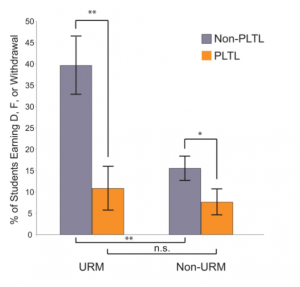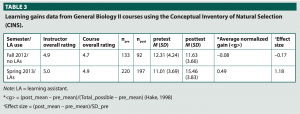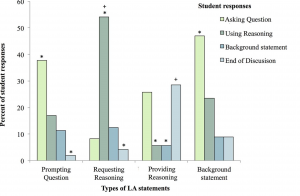Information for Instructors
Benefits of LAs in the Classroom
LAs Can Facilitate Active Learning
- Several studies have pointed to the value of adopting peer interaction and active learning strategies for increasing student learning and grade performance.
- Using LAs can help support the implementation of these high impact approaches.
- LA implementation in large lecture courses has helped lower the “activation energy” for active learning and contributed to its spread throughout an institution.
- When LAs are used to transform traditional lecture-dominated courses into a more interactive and inclusive format, it is generally at a ratio of about one LA for every 20-30 students.
LAs are Associated with Factors that Increase URM Persistence and Learning
- Two of the five exemplary Physics departments highlighted by the National Research Council for retaining URM students featured an LA program.
- A very recent study covering LAs used in 67 courses at 16 different institutions found that LAs decreased and helped flip the achievement gap.
- Peer-Led Team Learning (which shares many characteristics of Learning Assistants) led to decreased DFW rates in an introductory biology class, with a disproportionately higher effect for URM students (figure at right)
LA-Transformed Physics + Biology Courses Have Higher Learning Gains
-
A very recent study of LA use in 69 courses across 17 institutions found that LAs increased performance on physics concept inventories, with the largest impacts in labs, followed by discussion section, then lecture.
 A study at University of Colorado at Denver found that even when implemented by a variety of faculty members, many of whom were not familiar with physics education research, sections taught with LA-assisted tutorials achieved higher normalized gains.
A study at University of Colorado at Denver found that even when implemented by a variety of faculty members, many of whom were not familiar with physics education research, sections taught with LA-assisted tutorials achieved higher normalized gains.
 Most students surveyed about LAs agree that LAs helped them learn and feel more satisfied with the course.
Most students surveyed about LAs agree that LAs helped them learn and feel more satisfied with the course.
LAs Can Aid Institutional Transformation of Teaching By Focusing on Discussion/Lab
- While lectures are generally less collaborative, discussion and lab sections are ideal for LA augmentation.
- LAs can facilitate group work and collaborative learning in a discussion section through training and by simply supplying more available instructors to circulate in the classroom.
LAs in Lecture Can Increase Student Reasoning
 A study showed that in classrooms with LAs, students engaged in discussion relevant to the clicker question 93% of the time, even in sections with more than 200 students.
A study showed that in classrooms with LAs, students engaged in discussion relevant to the clicker question 93% of the time, even in sections with more than 200 students.- Groups who regularly interacted with an LA during lecture were more likely to both request reasoning during a discussion and to spend more of discussion time on task.
We Provide
- We provide a way to improve student learning and retention in your course. (See “Benefits of LAs” section for more info.)
- Because LA programs have been associated with increasing persistence of students from traditionally under-represented groups, you can list this as a diversity-increasing aspect of your teaching in your next merit review.
- We provide pedagogical training for LAs. Here is a link to the Winter 2017 Pedagogy Seminar Syllabus.
- LAs can provide support in responding to students using an online discussion forum.
- These other resources may be available as requested.
- We can potentially provide additional TA training.
- If requested and available for your course, we provide discussion worksheets to encourage group problem solving.
- As needed, we can provide a way to organize LAs to hold additional office hours for your students
We Ask From You
- We structure any LA supported component to compose mainly of students solving problems in groups (rather than TA lecture or problem solving on the board). For first time instructors, this can be in discussions or lab sections. For more interactive classes, LAs can be utilized in lecture.
- We ask that you have weekly meetings with your TAs and LAs to review discussion worksheets. (We are happy to offer support for this meeting.)
- It is ideal to allow us to administer online surveys, pre- and post-tests to students to assess the effect of the LA program on learning. This is most effective if you offer 0.5-1% extra credit for students who take these assessments.
Interested in Having LAs?
If you are interested in having Learning Assistants, contact Shanna Shaked by week 5 of the previous quarter or as soon as possible.
Email: shaked
Testimonials from Students and Instructors
“When I first arrived at UCLA, I was nervous to talk to a professor, let alone ask them for help, so I saw the LAs as approachable and knowledgeable figures.” -Student
“After visiting the Learning Assistant Alliance conference with Dr. Shaked, we combined efforts and formalized the LA program. I implemented LAs in my Intro to Molecular Biology Lecture (LS3) and had a wonderful experience with them. The LAs supported all the active learning and clicker use in the lecture hall plus were critical in making the discussion sections a valuable learning experience for all students. Given the rigorous training of the LAs and their recent completion of the course themselves, I would consider them extremely valuable for my instruction and they are as effective (if not more!) than the much more advanced graduate student TAs. All of the LAs I interacted with were highly motivated and easy to work with, I would recommend this program to anyone interested and to anyone who is thinking about implementing active learning but needs extra hands in the classroom to do so.” -Dr. Nadia Sellami
“Learning assistants are an incredibly useful resource for instructors whose objective is effective implementation of evidence-based teaching practices in their courses. I have been using LAs for a few quarters, and they have enabled much more meaningful integration of active engagement in lecture and discussion — LAs dramatically increase the number of meaningful, impactful conversations students have about course concepts. Moreover, serving as an LA gives undergraduates a unique opportunity to learn about facilitating effective collaborative learning environments, sharpen their skills of science communication, and it results in a deeper appreciation for the subject matter for which they serve as an assistant. I now find it hard to imagine running courses without LAs.” -Dr. Joshua Samani
Current and Past Instructors Involved
- Katsushi Arisaka (Physics 6B)
- Albert Courey (Chemistry 153C)
- Seth Dorfman (Physics 6B)
- Amy Fluitt (LS3)
- Alan Garfinkel (LS30)
- Jessica Lynch Alfaro (SocGen 105B)
- Elizabeth Mills (Physics 6 Labs)
- Chris Niemann (Physics 6C)
- Gaston Pfluegl (LS23L)
- Hung Pham (LS4)
- Glenn Rosenthal (Physics 6C)
- Joshua Samani (Physics 1A)
- Shanna Shaked (Physics 6-Series)
- Jane Shevtsov (LS30)
- Heather Tienson (Chemistry 153A)
- Steve Hardinger (Chemistry 14C/D)
Resources for Instructors Using LAs
Here is sample text for your syllabus and/or welcome email to your students:
Course Learning Assistants (LAs): LAs are UCLA undergraduate students who have completed this course (or a similar course). They are here to help you learn by fostering discussion and problem solving during lectures and discussion sections. LAs are not responsible for evaluating your work or assigning grades. To help everyone build reasoning and problem solving skills, they will tend to ask more questions and encourage collaboration, rather than always explaining answers.
Here is a website with more tips for teaching with LAs: https://serc.carleton.edu/sp/library/learning_assistants/index.html
